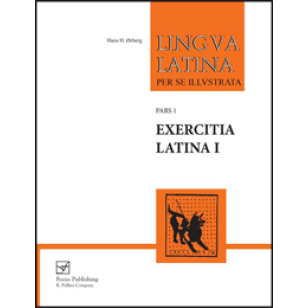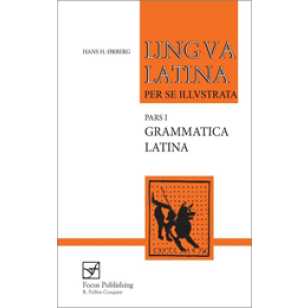Elementary Latin
- Course ID:LATIN 121/122
- Semesters:2
- Department:Classics
- Course Rank:Required
- Teachers:Joseph Lanzilotti
Description and Objectives
Elementary Latin introduces students to the Latin language using the immersive and communicative approach of Lingua Latina per se Illustrata by Hans Ørberg. This text will be supplemented by additional material to ensure that students are fully prepared for Intermediate Latin.
This is an introductory Latin course. Students need have no prior experience with the Latin language. The course aims to help students develop reading, writing, listening, and speaking skills in Latin through active participation in class. It provides a comprehensive introduction to and overview of Latin grammar. It covers different noun and adjective declensions, verb conjugations, and common pronouns. Additionally, the course emphasizes building a strong foundational vocabulary which is crucial for understanding and using the Latin language effectively.
The goals of the course include:
- Develop basic proficiency in Latin grammar, syntax, and vocabulary.
- Read and understand Latin texts in a variety of contexts.
- Explore cultural and historical aspects of the Roman world.
- Develop critical thinking and problem-solving skills through translation and analysis.
- Gain an appreciation for the influence of Latin on other languages and cultures.
Outline of Topics Covered
Nouns:
- 1st declension nouns
- 2nd declension nouns
- 3rd declension nouns
- 4th declension nouns
- 5th declension nouns
Adjectives:
- 2-1-2 adjectives (also known as -us, -a, -um adjectives)
- 3rd declension adjectives
- One termination (e.g., ingens)
- Two terminations (e.g., omnis)
- Three terminations (e.g., acer)
Verbs (Conjugations):
- All four conjugations (I, II, III, III-io, and IV)
- Active and Passive Indicative
- Active and Passive Infinitives
- Active and Passive Imperatives
Pronouns:
- qui, quae, quod
- ille, illa, illud
- is, ea, id
- hic, haec, hoc
Vocabulary:
The goal is to help students become familiar with the 500 most common Latin words, which will be essential for reading, writing, speaking, and listening comprehension in Latin.
Textbooks
1. Ørberg, Hans H. Lingua Latina: Pars I: Familia Romana (Second Edition, with Full-Color Illustrations) (Hardcover)

Students must provide and maintain brown paper covers for their Latin textbook. Covers must remain clean and intact throughout the duration of the course. In clear, large letters “Lingua Latina: Familia Romana” must be written on the front of the cover. The course name followed by the student’s last name must be written in all caps on the spine of the cover (ELEMENTARY LATIN – LAST NAME).
Textbooks must be covered by the beginning of the second day of class. Successfully and neatly covering the textbook will count as a perfect first quiz grade. Ten percentage points will be deducted from this quiz grade for every day that the book is not appropriately covered.
For instructions on covering your textbook, click here.
2. Ørberg, Hans H. Lingua Latina: Pars I: Exercitia Latina I

3. Ørberg, Hans H. Lingua Latina: Pars I: Grammatica Latina

Notebooks will be provided and must be kept in good order.
In addition to the supplied textbooks, the following are highly recommended:
- One of the many Latin-English dictionaries available.
- A standard reference grammar—for example Allen and Greenough’s New Latin Grammar (Many publishers’ editions are available from the original typesetting).
These are reference works to be used for a lifetime, and the student is strongly urged to consider that digital versions of reference works lack the characteristic of delay, the interval between the time when the question arises in the mind and the time when the question is answered. This is the time period in which the space in the memory where new information will dwell is created. One definition of learning is the expansion of the capacity for memory and the actual exercise of memory. Digital reference works skip this essential step of the learning process.
Course Requirements
Students are expected to arrive on time with textbooks, notebooks, and writing utensils. Students are expected to actively participate in class. Due to the immersive and communicative approach taken by this course, student participation during class is paramount.
Students will be expected to memorize paradigms for quizzes. On paradigm quizzes, the student will need to be able to reproduce the paradigm as it appears in the textbook and/or worksheet provided.
Students will be expected to memorize vocabulary lists for quizzes.
Students will be expected to read from their text every night on most days when there is not a quiz or test. This means being able to look at the Latin sentence in class and give an English translation, without looking back at notes or hand-written translations.
Students will take at least four tests, usually one per quarter. These tests will be comprehensive of the sentences, vocabulary, and paradigms of several chapters. If the student is consistently preparing for daily translations and quizzes, he should not need to study for these tests.
Successful Students
Students will come to class prepared for the day’s class. Preparation includes having completed any assignments that are due, being ready to listen and answer questions during the lecture, and finishing any and all assigned readings for the class.
Once in class, it is expected that students will be attentive and will show respect to their classmates and the instructor.
Successful students will:
- Pay careful attention, actively participate in class, and show respect toward fellow classmates and the instructor.
- Give all homework an honest and diligent effort.
- Study Latin continuously, without any interruption, for at least fifteen minutes each and every day of the week.
- Read the sentences of the current chapter out loud every day.
- Practice paradigms and/or vocabulary every day.
- Prepare sentences for in-class translation when assigned.
- Complete homework on time, and ask thoughtful questions when appropriate.
- Seek extra help at the first signs of difficulty, not only from the instructor, but also from classmates.
- Keep textbooks, notebooks, and personal effects in good order.
- Perform well on tests and quizzes through doing the above, as well as some additional preparation one or two days before a test.
Additional Resources
• Latin Grammar Handouts from The Latin Library
• Dickinson College Latin Vocabulary List
• Allen and Greenough’s New Latin Grammar (Digitized version hosted by Tufts University’s Perseus)
• Logeion online Latin and Greek dictionaries
• Mr. Babendreier’s Latin Verb Synopsis
Many other useful Latin and Greek language learning texts can be found at Textkit.com: https://www.textkit.com/learn/ID/109/author_id/42/